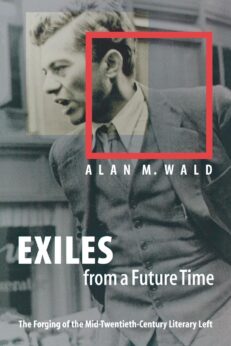Exiles from a Future Time: The Forging of the Mid-Twentieth-Century Literary Left
It has become commonplace in mainstream literary studies to argue that the impact on writers of involvement in the U.S. Communist movement was overwhelmingly negative. The argument usually goes something like this: while gifted writers tried very hard to “mold” their creative talents to meet the Party’s “requirements” for committed writing, they ultimately were unable to ‘limit’ themselves in this way if they wanted to develop their individual talent unimpeded and thus remain ‘good’ writers. Otherwise, they became “Party hacks,” and what they wrote was perhaps effective propaganda, but not ‘real literature.’

Alan Wald, author of a number of valuable studies of U.S. ‘writing from the left,’ has written an important new book, “Exiles from a Future Time: The Forging of the Mid-Twentieth-Century Literary Left” (paperback; University of North Carolina Press). An exhaustive study of dozens of writers, the book moves far beyond most previous studies in the breadth of its focus and the depth of its political perspective. It is intended, as Wald puts it, as a “collective biography” of the writers who “both shaped, and were shaped by, the Communist cultural movement in mid-century.” And it completely debunks the argument that writing in the service of a broader revolutionary movement always resulted in unhappy writers and bad writing!
Wald does not gloss over the tension that necessarily arose between and within writers, and sometimes between writers and others in the Party, who sought both to contribute to a collective progressive political project and to express themselves in their own styles and idioms. As novelist and Daily Worker columnist Mike Gold (born Itzok Granich) put it, the question was how to “reconcile craft with commitment.”
Although the attempt to do this sometimes resulted in some pretty clunky writing, it just as often succeeded in giving writers a way to get outside the limitations of bourgeois cultural standards that stressed individual (rather than collective) expression. One fine example of this is Langston Hughes’ brief poem, “Johannesburg Mines.”
In the Johannesburg mines
There are 240,000 natives working.
What kind of poem
Would you make out of that?
240,000 natives working
In the Johannesburg mines.
In this poem, which Wald uses as an epigraph, Hughes acknowledges that the fact of the exploitation of Black miners in South Africa, in effect, speaks for itself and that his proper role here, if he accepts representing these miners as one of his responsibilities as a poet, is simply to foreground this fact. The poem is eloquent and well crafted; it provides solid evidence that Hughes is a talented poet.
But its purpose is not to draw attention to his talent. Rather, the reader’s focus is on the miners who labor underground in conditions the poem causes them to wonder about, perhaps for the first time. The poet uses his voice to give voice to the miners.
Unlike most other studies of U.S. Communist and Communist-inspired culture, Wald’s book examines not just the better-known writers such as Hughes, the volatile Mike Gold, Meridel LeSueur, or Richard Wright. He also examines the contributions of dozens of lesser known writers, poets, and screenwriters. For some readers, this will be the most interesting part of the book.
 There is a fascinating section, for example, on Chicago’s Southside Writers Club, which provided a structure through which Black writers could debate the complex of issues that motivated their writing. Here we see how the collective effort of debating these issues with one another and reading each others’ work resulted in richer writing by individuals, both those who were Party members, and those who were not.
There is a fascinating section, for example, on Chicago’s Southside Writers Club, which provided a structure through which Black writers could debate the complex of issues that motivated their writing. Here we see how the collective effort of debating these issues with one another and reading each others’ work resulted in richer writing by individuals, both those who were Party members, and those who were not.
Here Wald makes one of his most valuable points. Through structures like the Southside Writers Club, or the John Reed Clubs, or the countless other organizations and magazines and forums its members supported, the Party “furnished a focus and theme, a potential audience and venues for publication for writers who might otherwise have gone unpublished” or remained in isolation from each other.
Thus, Wald can conclude not just that some of these committed writers actually produced good writing, but that CP writers and those in the Party’s orbit made a profoundly important contribution to twentieth-century U.S. culture. In fact, he argues, we should think not of individuals who benefited from working in or near the Party, but rather in terms of a “Communist cultural tradition.”
Studying this tradition can yield valuable models for how to nourish and celebrate the culture of our contemporary movement. Wald’s book, written in clear language and an accessible style, is a great tool for doing this. It’s something you’ll want to read.










